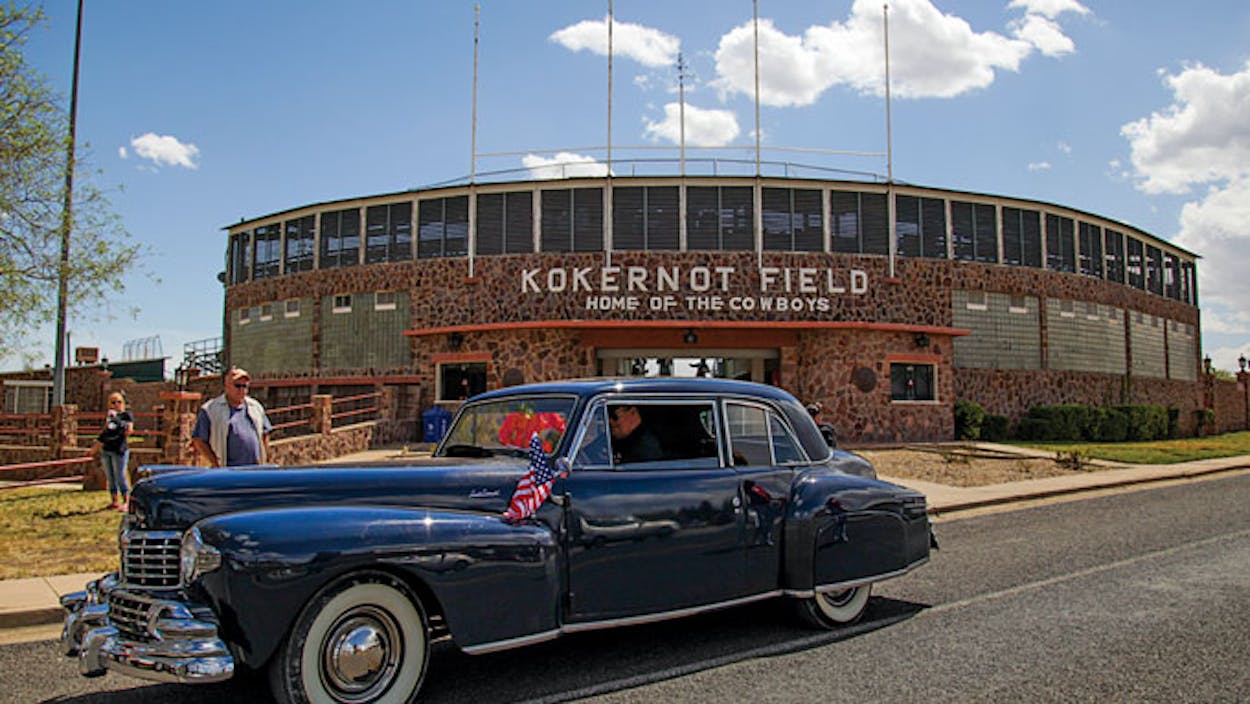KOKERNOT FIELD, ALPINE
The national pastime may not be our official state sport, but baseball diamonds have been drawn on Texas soil for nearly 150 years. Since the formal creation, in 1888, of the Texas League (one of the oldest baseball circuits in the country), some 101 Texas cities have supported minor league franchises, more than any other state. And so, every spring, many of us begin sneaking out of the office early and disappearing to the ballpark, where, as the New Yorker’s Roger Angell once wrote, “time moves differently, marked by no clock except the events of the game.”
There are few distractions from those sacred events at Kokernot Field, in the tiny West Texas town of Alpine. Built in 1947 by local ranching magnate Herbert L. Kokernot Jr., the summertime sanctuary has a ten-foot-high fence of native stone, and its red wrought-iron entrance gate bears the brand of Mr. Kokernot’s o6 Ranch. This oasis, home to the Alpine Cowboys of the independent Pecos League, isn’t plastered with advertisements (only a few banners for local businesses), and fans aren’t glued to the JumboTron (there isn’t one). Instead, visitors can gaze upon the Twin Sisters, notched peaks that rise far above the right fielder’s outstretched glove, while unwrapping another hot dog and secretly wishing for extra innings.
Off Texas Hwy 118 on E. Hendryx Dr/Loop Rd, alpine.pecosleague.com
WHATABURGER FIELD, CORPUS CHRISTI
Any slugger with Babe Ruthian ambitions would do well to extend his bat toward the rusted twenties-era cotton presses behind left field, or the Harbor Bridge out past center, or even the U.S.S. Lexington just beyond that. The waterfront home of the Corpus Christi Hooks, the Astros’ double-A affiliate, has the requisite amusement-park attractions (a climbing wall, a splash pad, a trampoline), but it’s the views of the bay and the site’s cotton-industry past that set this field apart.
734 E. Port Ave, 361-561-4665, cchooks.com
SOUTHWEST, UNIVERSITY PARK, EL PASO
This time last year, El Paso’s former city hall was being imploded to make way for a $64 million, nine-thousand-seat stadium, part of a controversial “if you build it, they will come” attempt to revitalize downtown. The triple-A Chihuahuas (formerly the Tucson Padres), who play their inaugural home game on April 28, can lay claim to having one of the only ballparks with a view of two countries and a menu that includes nachos served in a dog bowl.
One Ballpark Plaza, 915-533-2273, epchihuahuas.com
DR PEPPER BALLPARK, FRISCO
Boasting the highest attendance numbers of all thirty double-A teams for nine years running, the Frisco RoughRiders—and their stadium—are consummate hosts. The 360-degree concourse is dotted with gray-and-white pavilions that look like seaside cottages and is designed for maximum airflow—crucial given the summer heat. Speaking of heat: because the bullpens are built into the stands, you can get an up-close preview of the pitchers’ fastballs as they whir by.
7300 Rough Riders, 972-731-9200, ridersbaseball.com
DELL DIAMOND, ROUND ROCK
In 1999 legendary hurler Nolan Ryan threw a ceremonial first pitch from a makeshift mound in the middle of a cornfield, marking the groundbreaking of the Round Rock Express stadium. The house that Nolan built, now home to the Texas Rangers’ triple-A affiliate, includes a swimming pool, a kid-friendly Fun Zone, and a crisp new HD video screen. If you can’t finish your Nolie burger, toss the remainder in the compost bin, because this former farm site aims to be zero-waste.
3400 E. Palm Valley Blvd, 512-255-2255, rrexpress.com
- More About:
- Sports








